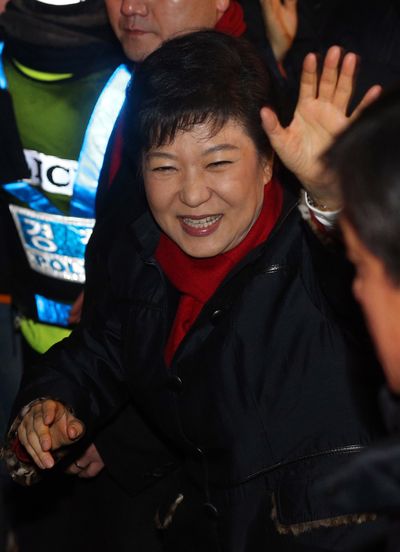S. Korean woman wins presidency
Park’s father led nation in ’60s, ’70s

SEOUL, South Korea – Park Geun-hye, the daughter of the strongman who ruled South Korea for much of the 1960s and 1970s, was elected Wednesday as the country’s first woman president after a divisive, hotly contested election.
Park, a member of the conservative Saenuri ruling party, has been a legislator since 1998. But her claim to fame before now came from her father, Park Chung-hee, who seized power in 1961 in a military coup and led the country until his assassination in 1979. Park, whose mother was killed in 1974, served as de facto first lady at state functions for the last five years of her father’s presidency.
The president-elect, speaking after liberal candidate Moon Jae-in had conceded defeat, pledged to strive for national unity.
“This election is the people’s victory,” Park, 60, told a crowd in Seoul.
Park, who is expected to take office in February, is likely to continue the conservative policies of outgoing President Lee Myung-bak, although she has said she will try to repair the relationship with North Korea that deteriorated under his government during the last five years. Park visited Pyongyang in 2002 and met with then-leader Kim Jong Il, whose son Kim Jong Un became North Korea’s leader after his father’s death a year ago.
Despite the robust democracy in this country of 50 million people, the irony was not lost that both Koreas will now be governed by the offspring of autocratic leaders.
Park is an outlier in South Korea’s tradition-bound society in that she never married, devoting her life to her family’s legacy and to politics. She interrupted her studies in France to help her father. She served four terms in the legislature, and sought the presidential nomination in 2007, losing to outgoing president Lee.
The election of a woman throws a new dimension into the political arena in South Korea, which despite its advanced economy, ranked only 108 of 135 countries in the World Economic Forum’s 2012 report on gender equality.
But some women tended to be dismissive of Park as just another in a long line of Asian daughters and widows who have risen in political office on the coattails of a powerful man, such as Indira Gandhi and Sonia Gandhi of India, Megawati Sukarnoputri of Indonesia, Benazir Bhutto of Pakistan and Corazon Aquino and Gloria Arroyo of the Philippines.
“She has done absolutely nothing for women. She is the daughter of Park Chung-hee, and she doesn’t sympathize or understand the common people,” said Lee Kyeong-ah, who is in her early 40s and was watching television results with other dejected Moon supporters at a cafe.